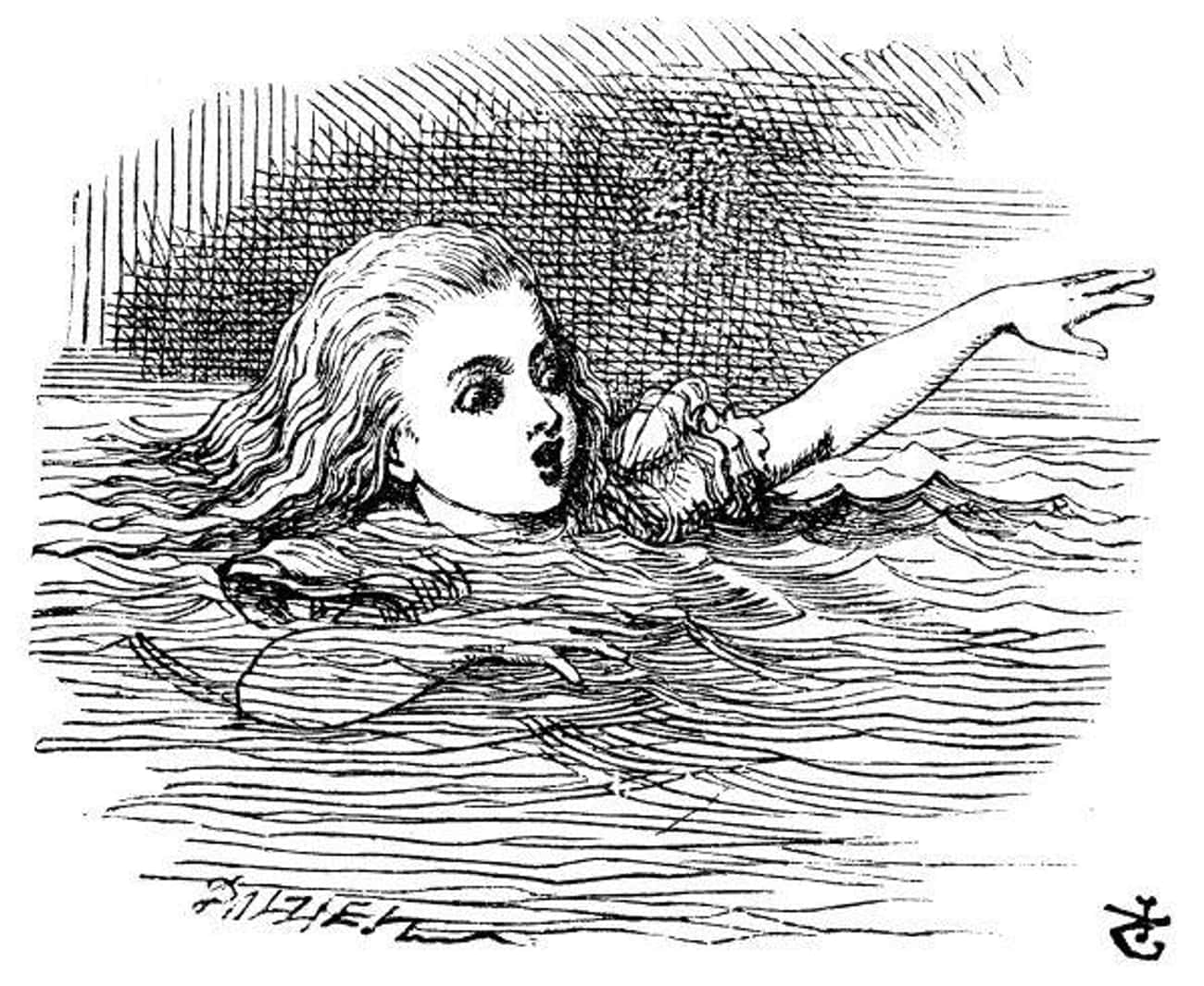Things That Happen to You When You Have Alice in Wonderland Syndrome
Your Body Will Either Feel Too Big or Too Small
Photo: John Tenniel / via alice-in-wonderland.netThe main symptom of AIWS is feeling that your body or parts of your body are not the size they should be. Imagine you're sitting calmly when you suddenly become aware that your hands feel very, very small. Even physically touching them does not shake the feeling that they're abnormally tiny. They even look small to you, or far away. This sensation is what someone with AIWS might feel.
In extreme cases, you might feel like your whole body is tiny, even inches tall, or that you are so huge, you can barely fit inside the room! Basically, you're just like Alice after she drinks from that shady little bottle.Things May Feel and Sound Wrong
Photo: John Tenniel / via alice-in-wonderland.netBesides your own body not feeling quite right, the physical sensation of other objects, as well as sounds, may seem warped or altered. Things that are solid may feel spongy to you, or sharp. This is, again, your mind playing with how you perceive things. Even if what you're touching is a solid block of wood, your mind may be telling you it feels like you're holding a chunk of pound cake. Even the ground might feel soft! As far as noises go, things may sound very distant or at an abnormal pitch. These are both rarer symptoms than feeling your body is out of whack, but they can be extremely disorienting.
You Won't Be Able to Keep Track of the Sizes of Objects Around You
Photo: John Tenniel / via WikimediaThere are times when people with AIWS retain an accurate sense of their own body, but the world around them is all sorts of twisted. Object sizes may be wrong. Things may feel very far away, or just tiny. Your brain may not understand that the table in front of you isn't several stories tall, or that the fork you're reaching for is actually closer than it appears. This can be stressful, especially when walking, because a hallway that in reality is only a few steps long may appear to stretch on forever.
You'll Lose Your Understanding of the Passage of Time
Photo: John Tenniel / via WikimediaThough the feeling that time is off-kilter is rare for AIWS sufferers, it can be very disconcerting. As you go about your day, you may have a sense of zooming through time, or of time not passing at all. Time that has already passed may feel absurdly short, and a single day may feel like mere hours. This, again, seems most prevalent in children, particularly in males.
You May Be Afraid of Being Crushed or of Crushing Others
Photo: John Tenniel / via alice-in-wonderland.netAIWS in itself isn't dangerous, but your brain and body doesn't always recognize that. Bouts of this syndrome can be highly stressful, and even frightening. Those with really bad cases may sometimes feel so small in comparison to other people that they feel they may be crushed, or worry they will fall a great distance off their chair to the ground.
Alternatively, sufferers may feel that other people are very small, and that they themselves are huge, and so be afraid of injuring those around them.
You'll Slip In and Out of Your Perception Changes Multiple Times Each Day
Photo: John Tenniel / via WikimediaThis confusing and stressful experience would be bad enough if you had it only once in a while, right? Instead, imagine it happens to you multiple times every day at random. This is a reality for many people with AIWS. The symptoms may come and go at any time, and when it starts happening, it's more than likely bound to happen more than once in a 24-hour period.
You'll Most Likely Get It as a Child
Photo: John Tenniel / via alice-in-wonderland.netAlice in Wonderland Syndrome is a fairly new discovery. In 1955, a man named Dr. John Todd discovered that certain people with severe headaches, including children, started having warped perceptions of reality, mostly relating to size. The condition is therefore often called Todd Syndrome, as well.
The fact that some of the people he looked at were children is no coincidence. The majority of cases of AIWS are seen in children. So if you hear a kid saying that their head is giant or their hands are tiny, or that the room is weirdly shaped, don't be so quick to dismiss them. They might really be seeing things that way.Your Brain Will Misunderstand Your Perceptions
Photo: John Tenniel / via WikimediaSo how exactly does AIWS work? To be honest, we're still not entirely sure. What we do understand is that it happens when there's an abnormal volume and flow of electricity in the body, which can then cause a change in the flow of blood to and through the brain. Because of this change, some signals sent from the brain to the eyes become distorted and misunderstood. Drug use, the Epstein-Barr virus, epilepsy, and brain tumors can all cause AIWS, but often there's no explanation at all.
You Might Also Have Severe Migraines
Photo: John Tenniel / via alice-in-wonderland.netAIWS and migraines, above all else, seem to go hand in hand. This actually has a lot to do with how the syndrome got its name. There are accounts of Lewis Carroll, who wrote Alice in Wonderland, having to see a therapist because he reported terrible migraines as well as feelings of his environment being warped in size. People have theorized that this is one of the earliest recorded cases of AIWS.
Migraines themselves seem to nearly always be present when AIWS displays, so there's a good chance the two are strongly linked. In other words, if you have AIWS, you're unfortunately bound to have a killer headache or two, as well.You'll Feel Worse Right Before You Go to Sleep
Photo: John Tenniel / via WikimediaAlthough these feelings may happen at random, there's one time when they tend to be the most common, and that's right before bed. Just as you're about to go to sleep, you might suddenly have the feeling that your body is very small in your bed, or that your limbs are very tiny. Maybe your room will feel absurdly large, or very tiny to you. This seems to happen for both children and adults. Perhaps this is why some kids are more prone to nightmares?
You'll Be Unable to See It Coming
Photo: John Tenniel / via WikimediaAlthough it's more likely at night, and although it's often accompanied by migraines, the honest truth is that there's no way to predict when an AIWS episode is going to hit you. It won't happen with every migraine, and it won't happen every night, and it could happen without either of those two precursors. The fact is that there's not a lot you can do to figure out when you're suddenly going to feel like Alice in Wonderland.
Your Doctors Will Probably Check for Brain Tumors
Photo: John Tenniel / via alice-in-wonderland.netThe sad fact is, many doctors have no idea what AIWS is, or why it's happening. Once doctors recognize that something is wrong, they will likely send you for a CT Scan to check for tumors. As it turns out, AIWS is sometimes linked with brain tumors, so that's not a bad call. But don't worry - most of the time there are no tumors to be found. Generally speaking, AIWS is completely physically harmless.
You'll Have No Idea How to Control It (and Neither Will Your Doctors)
Photo: John Tenniel / via WikimediaEven if your doctor knows what AIWS is, there's really not much they can do about it. They can recommend a better sleep schedule and a different diet, and they can treat your migraines. But unfortunately, beyond that, there's no known treatment or preventative measures for AIWS, and there haven't been many scientific breakthroughs concerning the condition.
As for you? Well, you can try to make yourself as comfortable as possible, but you can't cure yourself and you can't make it stop once it starts happening. But don't panic, there is good news...You'll Just Have to Hope It Goes Away on Its Own - Which It Might!
Photo: John Tenniel / via alice-in-wonderland.netAll this might sound pretty daunting, but there is actually an upside here. Most cases of AIWS happen in childhood and spontaneously vanish as you grow older. Alternatively, if you have the condition as an adult, it still sometimes manages to go away on its own, without any treatment or lifestyle changes. So the bright side is, you might only be feeling little for a little while.























